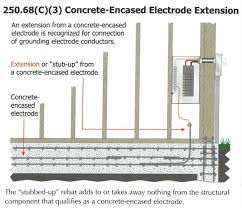Understanding Ufer Grounding: What You Need to Know
- Dylan Harris
- Feb 1, 2025
- 3 min read

At first glance, a Ufer ground might look like an odd combination of materials: a piece of rebar embedded in a concrete slab with a copper wire attached to the rebar by a clamp.
The Ufer ground—named after Herbert G. Ufer, who developed the method during World War II—is a type of grounding system that uses the concrete foundation of a building as a conductor. Essentially, it allows stray electrical currents, like lightning strikes or faults, to safely dissipate into the earth.
How Does It Work?
Concrete, though not an obvious conductor, is surprisingly effective when it comes to grounding electricity, especially when paired with steel reinforcement bars (rebar). The Ufer ground takes advantage of this by embedding a piece of rebar or copper wire in the concrete foundation of a building. Here’s why it works so well:
Moisture Content: Concrete retains moisture, even in dry climates, which enhances its conductivity.
Surface Area: The large surface area of the concrete foundation in contact with the earth improves its ability to dissipate electrical energy.
Durability: Being encased in concrete protects the grounding components from corrosion and physical damage, making it a long-lasting solution.
Why Do We Need a Ufer Ground?
Grounding is one of the most critical aspects of any electrical system. Without a reliable ground, stray electrical currents could cause serious problems, such as:
Electrical Shock: Faulty wiring or damaged equipment could expose people to dangerous electrical currents.
Fire Hazards: Stray currents can generate heat, potentially leading to electrical fires.
Equipment Damage: Sensitive electronic devices are particularly vulnerable to voltage spikes and surges without proper grounding.
The Ufer ground provides a robust and reliable grounding solution, especially in areas where traditional ground rods might not perform well, such as rocky or dry soil conditions.
Ufer Ground vs. Traditional Ground Rods
Why not just stick a metal rod in the ground? While traditional ground rods are effective in many situations, they can be less reliable in certain soil conditions. For instance, dry or rocky soil may not provide good conductivity, which can compromise the effectiveness of a ground rod.
The Ufer ground, on the other hand, excels in challenging environments. Combining concrete and rebar creates a superior grounding system that works in almost any condition.
Fun Fact: Military Origins
The Ufer ground was first developed for military use during World War II. In dry, arid climates, concrete bunkers needed effective grounding systems to protect equipment and personnel from electrical faults and lightning strikes. Herbert G. Ufer’s innovative method proved so effective that it quickly became a standard practice in the electrical industry.
Why A Homebuyer Should Care?
Whether you’re a homeowner, a builder, or just someone curious about how things work, understanding the Ufer ground is a great way to appreciate the hidden systems that keep our modern lives running smoothly. The next time you see a concrete foundation, remember that it might be doing more than just holding up a building—it could play a vital role in electrical safety.
Is The Ufer Ground Common In Northwest Arkansas?
In diverse soil composition, Ufer grounds are beneficial. In areas where traditional ground rods may not perform optimally due to soil resistivity, Ufer grounds offer a reliable alternative. As Home Inspectors in Northwest Arkansas, we see them present in homes so it is good to be aware of what there are. Ufer grounds are not as prevalent here in Northwest Arkansas as they are in drier and rockier areas when Ufer grounds are commonly used.

Key Takeaways
The Ufer ground is a grounding system that uses concrete and rebar to dissipate electrical currents safely.
It’s particularly effective in challenging soil conditions and provides long-lasting durability.
Developed during World War II, the Ufer ground remains a cornerstone of electrical safety today.
So, the next time you hear someone talking about grounding systems, you’ll know that the Ufer ground is more than just an odd name—it’s a critical grounding system that’s been protecting us for decades.



Comments